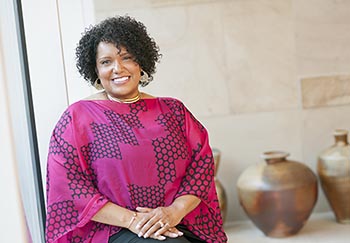
Editor’s note: Our blog team is deeply saddened to learn that Drema died on Nov. 11, 2016. We really enjoyed meeting her and her husband and sharing her story. She made a positive impact on many people’s lives. Our thoughts are with her loved ones.
Attitude is everything.
Years ago, when Drema Robertson worked as a manager for a major developer of shopping malls and centers, she wore a pin adorned with these words to work every day.
“I used to share that with my employees,” she said. “The way you think determines your outcome. If you think positively, you draw positive to you.”
Today, the same three words are central to how Robertson, 60, lives with stage 4 cancer. Though she is likely to lose her life to cancer, Robertson says she’s grateful for the time she has and feels at peace.
“Whichever way this turns out, I’m okay,” she says.
For Robertson and others with life-threatening illnesses, considering all areas of well-being — psychological, social and spiritual, in addition to physical — can mean better quality of life. Studies show it can also help patients live longer, according to Linda Duska, MD, who treats gynecologic cancers at UVA. While it’s not possible to know if Robertson’s positive thinking has prolonged her life, she’s continued to enjoy life even while facing an aggressive cancer.
“You have to address all spheres of a person’s life for them to do globally well,” Duska says. “While [Robertson’s] physical sphere isn’t always doing well, the rest of her spheres are robust because of who she is. Because of that balance, globally she does much better.”
Facing a Serious Illness?
Palliative care focuses on pain and symptom management and improving your quality of life. Learn more about palliative care at UVA.
Robertson says she remains continually grateful to be alive.
“This process has been something I think the Lord has carried us through,” she says. “There are blessings even in situations that are meant to devastate you. I feel blessed and I have peace.”
Life With Cancer
Robertson first learned she had cancer in November 2012, when a doctor near her home in Beckley, West Virginia, found cancer cells in fluid on her lungs. Her doctor referred her to Duska.
From the beginning, Duska said she was struck by Robertson’s positive outlook.
“She has a faith in people — in her husband, her physicians,” Duska says. “She deals with the cards she’s dealt. It’s an acceptance. She radiates calm.”
Duska diagnosed Robertson with stage 4 ovarian cancer.
“The disease had spread to her entire abdomen,” says Duska, who performed surgery to remove the cancer and prescribed chemotherapy.
Robertson’s cancer oscillated between getting worse and better, as Duska administered various chemotherapy drugs, including one in a clinical trial. Several stopped the cancer from growing for periods of time before they stopped working.
Through it all, Robertson’s husband of 43 years, Cedric, has been by her side.
“We both help each other,” she says. “We know each other’s strengths and weaknesses. We know how to pull each other up.”
At the end of 2014, Robertson moved dangerously close to death.
“She had a lot of disease in her lungs and was having a lot of trouble breathing,” Duska says. “I was really worried I wasn’t going to be able to treat it, and she was going to die. We found a chemotherapy that worked and turned things around.”
Robertson says prayer helps her through her toughest moments.
“We made time every morning for devotions when I was really sick,” she says. “It just meant so much to me.”
Now Robertson finds herself in the same place as before. With cancer in her windpipe, she’s having difficulty breathing again.
“We’re trying the same drug as before to see if it works again,” Duska says. “She’s in trouble right now and I’m really worried about her. If this treatment doesn’t work, we might have a big problem.”
Even if the treatment works, Robertson might still lose her life to cancer in the next year or two, Duska says.
“Most women with advanced ovarian cancer will reach remission, but then later will have their disease come back,” she says. “The five-year survival rate for stage 4 ovarian cancer is 17 percent. But we’ve been surprised before.”
Robertson says she’s prepared for any outcome.
“I’m not afraid to die,” she says. “My sadness is in leaving the people I love. I don’t want to go, but if I were to go, I’d be okay.”
Words of Wisdom
For others facing stage 4 cancer, or any difficult situation in life, Robertson offers the following advice:
Be Grateful
“Be grateful for every day, because you didn’t have to be here,” she says. “When you can wake up and say I’m grateful to be here, it gives you a kind of peace throughout the rest of the day. Life is too short to be miserable.”
Do What You Love
Robertson has been a minister for nearly 20 years. “I haven’t let cancer stop me,” she says. “Prison ministry is a big part of what I do. I also operate a substance abuse ministry out of my church. It’s what I love. Seeing people’s lives changed through the word of God is always uplifting to me.”
Focus On Your Health
“My first priority is my health,” Robertson says. While she hasn’t stopped ministering, she’s cut back when needed.
Help Someone Else
“I’ve found that helping others, ministering to others, gets my mind off myself,” Robertson says. Whens she talks with others who are struggling, “we inspire each other to persevere,” Robertson says. “We’re all going through something. It may not be the same thing, but something.”
Robertson says she also regularly receives calls for help from people who don’t know she has cancer. “It may not be on my best day, but something in me feels the compassion to pray with someone else,” she says.
Lean On Others For Support
Robertson says her husband, adult son, mother and sisters have all helped her through tough moments. “My family is very tight-knit,” she says. “My mother has been a rock through all this. And my husband I couldn’t have done without.”
Maintain Healthy Boundaries
“You have to separate yourself from negativity, especially when your own health is at risk,” Robertson says. “I don’t have time for gossip. People know that and no one calls me with that foolishness. These are things that have no importance or meaning to your own life. You don’t need that.”


Drema Robertson is my friend. She is one of the strongest, beautiful people I know. If Anyone can beat this, she can! She is protected by the love of God.
May God continue to bless u and family. My mother speaks godly of you MRs. Doll is my mom.
May the Joy of the Lord continue to be your strength. I know that it was the Word of the Lord that you spoke that planted the seed that gave me hope and I thank you! Your love for me has inspired me to keep fighting I love you for you! Many Blessings and much prayer for you and family!
I will keep you in my prayers!!! You are a very strong person to be able to handle this..but I know that you are not doing this alone…..God is with you!!! Love you!!
Drema may God continue to carry you in his hands and I know he will. There have never been a time I have seem you, that you didn’t have a smile on your face and a kind word to say. You’re a postive Holy Ghost fill strong roll model to everyone. Praying for God to continue to heal you. Love and Prayer: from Sister Verna Jackso and Family.
EVERY PRAISE BELONGS TO GOD.. Your Faith in GOD & UR being a Vessel 2 others has helped carry U thru. Thank God for ur determination & positive attitude. I love much Niece, DREAMA. May God’s most BOUNTIFUL BLESSINGS continue 2 surround U @ all times
praying for you, you are a awesome person, God bless you and your family………
Much love and prayers.
Much love and prayers
Minister Dreama was everything a woman of God should be. She was always operating through love and compassion. She invested time in my life and rescued me from a life of termoil. Ill say it again. Beautiful Woman of God. Rest well Queen.. Prayers to Bro Cedric and the Robertson family..Love you all.
I would like to thank everyone for their
Kind words of expression For my sister zEvsnd .Evangelist Dreama Robertson*..
Thanks to everyone for the kind words of expression for my sister Evang.
Drema Robertson . She will truly be missed, and we thank God for her Legacy.